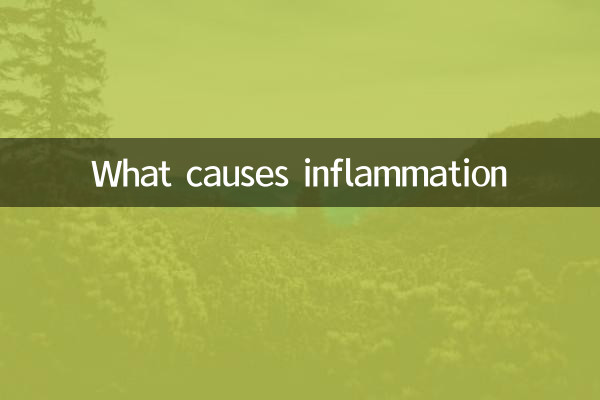What causes inflammation
Inflammation is a natural response of the body's immune system to damage, infection or stimulation. Although inflammation is an important mechanism for the body to protect itself, long-term or excessive inflammation can lead to multiple health problems. So, what exactly causes inflammation? The following is a summary of popular topics and hot content on the entire network in the past 10 days. Combined with scientific research and the focus of public attention, we will analyze the causes of inflammation in detail.
1. Common causes of inflammation

There are many triggers for inflammation, and here are some of the most common causes:
| Cause category | Specific factors | Example |
|---|---|---|
| Infect | Bacteria, virus, fungi, parasites | Influenza, pneumonia, skin infections |
| Physical damage | Trauma, burns, frostbite | Cuts, sprains, sunburns |
| Chemical stimulation | Toxins, pollutants, drugs | Alcohol, cigarettes, certain antibiotics |
| Abnormal immune response | Autoimmune diseases | Rheumatoid arthritis, lupus erythematosus |
| Chronic diseases | Obesity, diabetes, cardiovascular disease | Long-term hyperglycemia, arteriosclerosis |
2. Recent hot topics related to inflammation
In the past 10 days, the discussion on inflammation across the Internet has mainly focused on the following aspects:
| topic | Popularity index | Discussion focus |
|---|---|---|
| Diet and inflammation | high | Does sugar, trans fat, and processed foods aggravate inflammation |
| Intestinal health | high | The relationship between intestinal flora imbalance and chronic inflammation |
| Exercise and inflammation | middle | Can moderate exercise reduce inflammation |
| Air pollution | middle | Does PM2.5 and ozone cause respiratory inflammation |
| Sequelae of COVID-19 | high | Are long-term COVID-19 symptoms related to persistent inflammation |
3. How to reduce inflammatory response
To address the causes of inflammation, the following measures can be taken to reduce the risk of inflammation:
1.Adjust diet: Increase anti-inflammatory foods (such as deep-sea fish, nuts, green leafy vegetables) and reduce high-sugar and high-fat foods.
2.Regular movement: Moderate exercise can help reduce chronic inflammation, but excessive exercise can backfire.
3.Manage stress: Long-term stress will increase inflammation markers, and it is recommended to relieve it through meditation, yoga and other methods.
4.Improve sleep: Deficiency of sleep is closely related to increased inflammation levels, ensuring high-quality sleep for 7-8 hours.
5.Avoid toxins: Reduce exposure to cigarettes, alcohol and air pollutants, and reduce inflammation caused by chemical stimuli.
4. Summary
Inflammation is a complex defense mechanism in the human body, but its causes are diverse, including infection and damage, and are also closely related to lifestyle. Recent hot topics show that the public is particularly concerned about the relationship between diet, intestinal health and environmental pollution and inflammation. By scientifically adjusting lifestyle habits, inflammatory response can be effectively controlled and overall health level can be improved.
If you have persistent or severe symptoms of inflammation, it is recommended to seek medical attention in time to rule out potential disease risks.

check the details

check the details